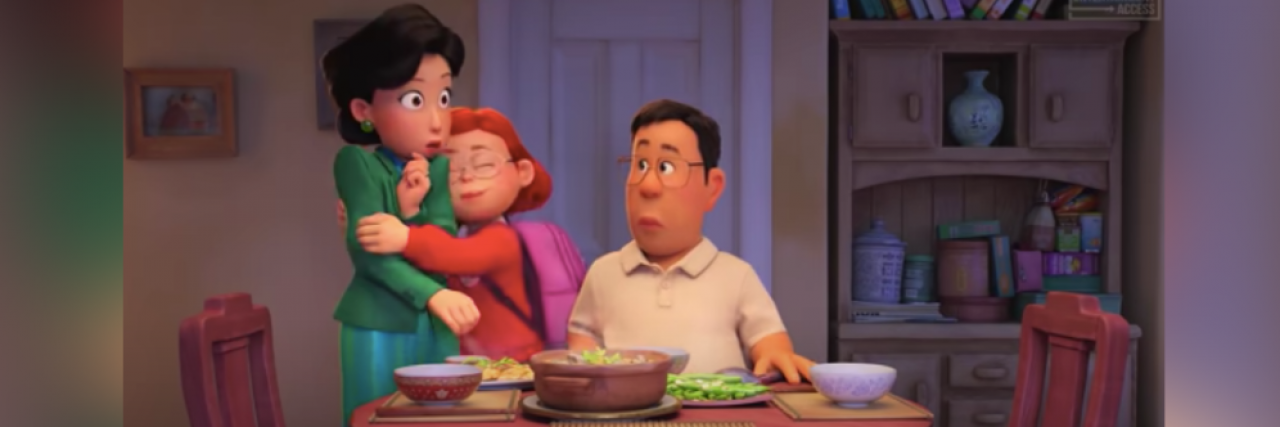How Pixar's 'Turning Red' Helped My Generational Trauma
Editor's Note
This is a recap for “Turning Red.” There will be spoilers beyond this point. Please proceed with caution (because we don’t want to be the ones who spoil you!)
Do you ever sit down to watch a movie and think “Can’t wait to watch this super cute relaxing movie,” only to be met so much internal reflection that you end up crying so hard that you can’t breathe? No? That was just me when I watched “Turning Red“?
As a local Torontonian resident, I was practically jumping for joy when I first saw the trailer for “Turning Red.” Not only because it was set in my city (when is anything ever set in Toronto?!), it was a movie about Chinese culture, front and center. I knew I would be emotional watching this, not only because of the representation on the screen, but in terms of the actors, director, screenplay, story, and cinematography.
I expected to laugh and maybe shed a tear, but what I didn’t expect was the deep emotional response that I got from seeing the generational trauma and the healing.
And, my dear friends, when I tell you I was sobbing on the couch… Let’s unpack that, shall we?
“Turning Red” spoilers ahead!
If you’ll allow me to give you the shortest, worst summary ever: a young girl, Mei, turns out to be descended from the Red Panda, and that her mother and grandmother and aunts have all had to find a way to “tame the beast,” so to speak, for generations and generations.
There is so much to unpack here but the main theme for me (read: the reason why I cried so much) was the generational trauma and the healing that we were able to see for Mei. The healing that we work towards and strive for in our actual lives everyday.
First things first: what is generational trauma?
Generational trauma is essentially the “passing down”of oppressive or traumatic effects from one generation to the next generation within families.
It’s like this: a traumatic event (personal, global, small scale, large scale) occurs to one of your ancestors and if that trauma isn’t healed, it will begin to negatively affect further generations. And unfortunately, a lot of families may likely “cope” with this trauma — a trauma that they may not even be aware of — through denial or minimization.
I knew that I would be able to see myself in this story, but what I wasn’t expecting was to learn to see others in this too — namely my mother and grandmother and all of my ancestors.
I am first generation Chinese Canadian, my parents having immigrated here before I was even born. And by the time I was in high school, I knew that there would be differences in how I navigated the world compared to how my parents navigated the world. At its core, it’s a major cultural difference. Word choices, setting boundaries, even comparative expectations (why did my mom expect such high performance at school when my friends’ moms didn’t even seem to care?). The core ways in which we formed our identities are so drastically different.
In “Turning Red,” Mei feels as though she loses her identity and meets this with fear, especially after learning about her mother and grandmother’s sacrifices and their own respective suppression of their true selves.
You mean… older generations suppressing who they are? Projecting that onto younger generations for years and years? An ongoing cycle that was just accepted as normal because “that’s the way that its has always been”? Their love for their daughter so strong that it broke through literal generations of self-oppression? A loving partner so strong and understanding that you didn’t feel as though you were asked to be someone who you weren’t?
The final healing of breaking the cycle? How could you NOT cry?
This is all I’ve ever wanted and it’s all that I work towards every day. Accepting your ancestors for who they are — without judgment. Seeing your parents for who they are: people who are trying their best to love you in the only way they know how. Seeing grandparents and aunties as real people. People who are a product of their environment.
Making the conscious choice to break the cycle. It’s hard, but you can do hard things.
Image via Entertainment Access YouTube

